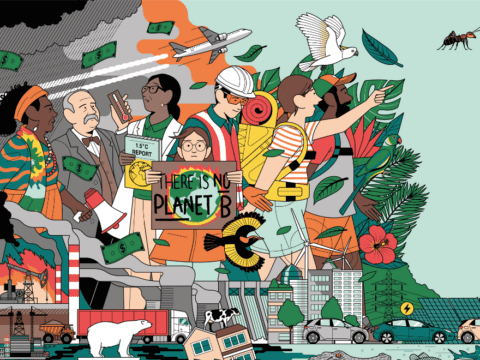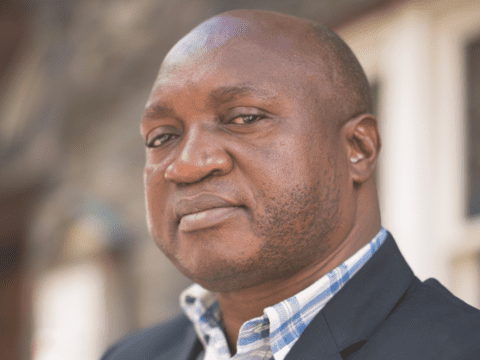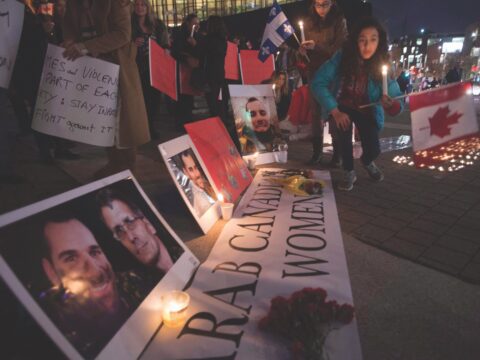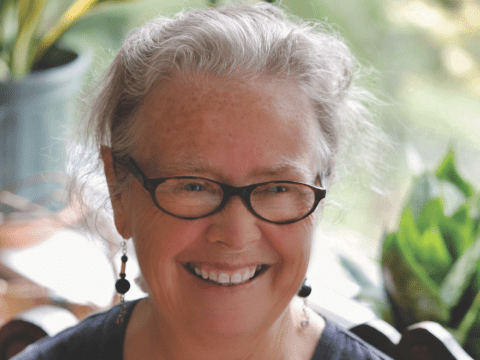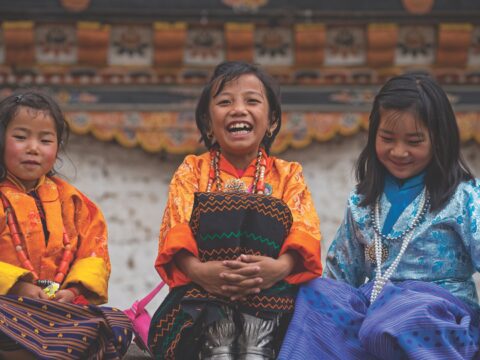Rim Badal, 15, stands outside the registration centre of the Doro refugee camp in the Maban district of South Sudan last May. It is around 9 a.m. and the heat is building along with the lines of men, women and children who are waiting to receive help. They will join more than 80,000 others who have already made the long journey from danger to what they have heard — what they hope — is safety.
Rim arrived here yesterday with 453 others from her community in the Nuba Mountains. They walked for nine days, carrying plastic tubs filled with possessions, some even hauling bed frames. “We are hungry, and that’s why we came here,” she says. “Our area was bombed, and a few days ago there was a bombardment.” Her school was destroyed. Asked why there is so much fighting in her region, she answers in a quiet, weary voice: “I don’t know why the people fight. I just find myself inside the fighting.”
The why of South Sudan, the world’s newest nation, is a long answer. Posters still hang around the airport in Juba, the capital, promoting the January 2011 referendum for separation from the north, whose government the south had struggled against through decades of bloody conflict. Not surprisingly, the vote was a resounding yes.
Independence Day for South Sudan was July 9, 2011. Few thought peace would descend like a dove right away to a region best known for hosting Africa’s longest-running civil war. And it hasn’t. The new border that divided the old Sudan into two locked the Nuba Mountains into the north, and into the crosshairs of an Arab-dominated government routinely accused of wanting to cleanse its country of the black Africans that populate the area. Add religious differences (a mostly Muslim north and Christian south) and the fact that the bulk of the region’s oil is in the south, with the pipeline used to transport it in the north, and Rim’s innocent and sad answer rings even more true. She is caught inside the fighting.
Mukesh Kapila, the former head of the United Nations Mission in Sudan, recently told reporters in Kenya, “Darfur was the first genocide of the 21st century. And the second genocide of the 21st century might be unfolding right now in the Nuba Mountains.”
For the people of the Nuba Mountains, there has hardly been a break from the violence of air and land attacks. Now hunger joins the list of why people flee, as the conflict disrupts planting and harvesting. The malnutrition crisis is growing deadlier by the day.
Osman is one of the oldest members of the group that travelled with Rim. “We carried our kids on our back,” he says. “Our village is a large village, burned by our enemies. We hope for services, food, water; that’s why we came here. Otherwise, we don’t know any other place to go.”
New arrivals at the camp can number in the high hundreds on a particularly intense day. Moving through the registration system, they answer questions about who they are and where they have come from at the UN High Commissioner for Refugees table, set up in an open-air straw enclosure. Next is the Samaritan’s Purse station, an evangelical organization that screens children under five for malnutrition and distributes food rations supplied by the World Food Programme. Samaritan’s Purse is also in charge of water, a constant challenge within the ever-expanding camp. The refugees then move on to Médecins Sans Frontières for vaccinations.
There is a collaboration of compassion happening here among the various faces of the humanitarian community. Each of these non-governmental organizations shares the goal of bringing in from the outside what the refugees cannot supply for themselves. (Through its participation in ACT, an alliance of 130 churches and other organizations, the United Church supports humanitarian efforts in South Sudan’s Jonglei region, where violent tribal clashes claimed at least 1,000 lives last year. The United Church also partners with the Sudan Council of Churches.)
Jared Opudo is a maternal and child health program co-ordinator in the Doro camp. He says that South Sudan has one of the highest maternal mortality rates in the world. On this day, one woman has beaten the statistics. She lies on a blanket on the floor of a dim room serving as a maternity ward in the camp hospital, a couple of hours on the other side of an emergency Caesarean section. She made it, and so did her baby, for now. “Pregnancy and childbirth in South Sudan sometimes equates to a death sentence in the absence of health facilities,” says Opudo. He sees the expanded hospital service for refugees as filling a vital gap.
Staff here are educating refugees on sanitation and basic health care, and in many cases providing medical attention that would be difficult to access elsewhere. In fact, something painfully ordinary is about to unfold in the operating room: next up is a hemorrhoid operation.
The non-dramatic nature of the last procedure on this day’s roster speaks to a reality of life in a refugee camp that may surprise visitors. Some semblance of ordinary living eventually resumes in this makeshift place that looks, sounds and smells like a sprawling, packed town.
Opudo is obviously proud of the health care he is helping to offer at the camp, and proud of his fledgling country. “We felt [the referendum] was a big step forward. It is a new chapter and an opportunity for South Sudan to control ourself,” he says. “We are more stable. It is easier to engage with government authorities. Policies can be developed and held more firmly.” During the war, he continues, “we were in relief mode. Now, we are in development mode.”
Opudo works alongside Dr. Atar Ahada, a surgeon and the lead hero, if only one can be named, of this clinic-turned-hospital. Ahada is most famous for sending his staff home from a hospital that was being bombed at the height of the civil war, and staying there himself like the captain of a sinking ship.
“It was not easy,” says Ahada of his months with no communication with his wife and four sons, living with few supplies in a war zone. “I was told I would die. But people die everywhere. It is not in my hands.” Faith keeps him going through difficult situations. “I can work anywhere, but I believe God has called me here. That is why I am here,” he says.
This theme of being called to serve others, no matter the danger, rings throughout this camp and the Yida refugee camp, a two-hour Cessna flight away and even closer to the conflict zone.
Such is the case for Oum Jouma, den mother to 561 girls who find themselves at Yida with no parents. Sometimes they show up with neighbours from their home villages, sometimes in large groups with a teacher because their school was bombed. There are unsupervised boys here as well, but there is a definite sense that boys can wander freely around the camp in a way the girls do not dare.
Jouma was once an unaccompanied minor herself, years ago when the civil war raged. She remembers feeling afraid and utterly alone until she found help. “I wanted to help,” says Jouma, “because I was helped. Maybe one of [the girls] will become like me.”
For their own security, the girls live together in a compound in the heart of Yida, enclosed by thick straw walls. Scattered cooking fires smoulder on the packed red dirt inside the perimeter. The girls do their own cooking using their food rations. Older youth are assigned to shepherd younger girls along. Girls cluster in small groups, doing each other’s hair. They giggle quietly at visitors who ask to take their picture, and then explode in laughter and mutual teasing when they glimpse the digital results. Twenty-four girls have joined this camp-within-a-camp in the last three days alone.
Jahila Anjelo, 16, has been in Yida since last November and lives in the compound. She came to the camp by rickety bicycle with her two brothers. They survived the journey on groundnuts and a small amount of water. “My girlfriends were killed. That is why we have come here. To forget,” says Jahila, hands clasped tightly in front of her. In addition to seeking safety, she was resolved to continue her schooling. “I want to learn so I can help my people in the future.” She dreams of becoming a doctor.
She also wants to feel safe, which eludes her still. “I don’t know if maybe something will happen to me again in this compound,” she says.
Her fear is not so far-fetched. Yida camp was bombed last November. The explosives that hit the grounds of the camp didn’t detonate, but the sound of the Russian-built warplanes circling overhead was all too familiar to the refugees. The United Nations has warned that they do not consider this camp, located 18 kilometres from the Sudanese border, a safe place to be.
Safe is not a word used to describe many parts of South Sudan these days. “It’s indiscriminate,” says Ahada of the violence. “We are all a target. There is no place that is safe.”
Friday afternoon in the Juba airport is exodus time for travellers anxious to get out of South Sudan for the weekend. The tiny airport is packed, and if you want to keep your seat on the plane, you better get there in plenty of time. There are people waiting to buy it out from underneath you.
New arrivals stream in too. The airport hosts an architect here to do business and a woman wearing a Médecins Sans Frontières vest. She is looking for a lost bag. People are standing in long, loud lines to enter and exit the world’s newest country. White United Nations helicopters line the runway.
There is no doubt that the world is watching South Sudan with concern, with interest, with hope. Back in the refugee camps, hope also burns, although it is a more basic life-and-death kind of hope. People hope the bombardments will stop. They hope the NGOs will dig more wells. Kids hope to find their parents. And everyone hopes to go back home.
***
This story first appeared in The United Church Observer’s October 2012 issue with the title “War without end.”










